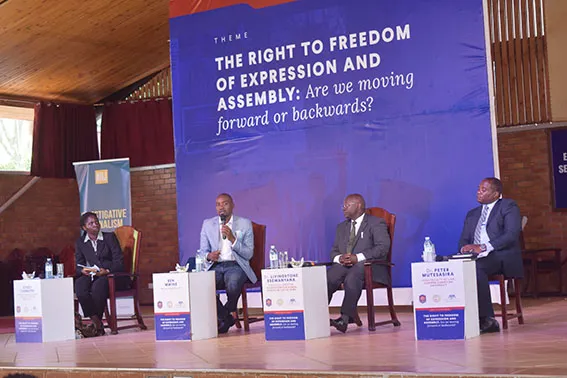By Israel Kisakye
Syndia Chemutai is an amiable person. Her demeanor has always won her friends, and the case was not any different when she became a Faculty of Law student at Uganda Christian University (UCU). It is through her disposition that the lecturers at the Faculty of Law quickly learned of Chemutai’s love for the protection of free speech.
Her gift of hospitality and openness about free speech importance contributed to her selection in April as the student to sit on a panel of discussants about the state of press freedom in Uganda. The talk, held under the theme The right to freedom of expression and assembly: Are we moving forward or backwards? was organized by not-for profit organization, African Institute of Investigative Journalism (AIIJ).

To set the stage for Chemutai and her co-panelists to dissect issues of freedom of expression and assembly, the attendees were first shown Targeted, an AIIJ documentary detailing stories of journalists who were targeted by Ugandan security as they covered the presidential campaigns ahead of the January 2021 Ugana general election. The screening of Targeted and the panel discussion took place at UCU’s Nkoyoyo Hall.
To calm her nerves of sitting on a panel for the first time, Chemutai came armed with as much research as possible. Chemutai found several examples of incidents where rights to freedom of expression and assembly have been curtailed in Uganda. During her presentation, she urged authorities to exercise more restraint as they seek to respect the rights to freedom of expression and assembly as enshrined in Uganda’s laws, as well as international statutes.
Others on the panel were Dean at the Faculty of Law, Dr. Peter Mutesasira; human rights scholar and lawyer, Dr. Livingstone Sewanyana; and media personality, Ben Mwine. The panel was moderated by investigative journalist and AIIJ executive director Solomon Serwanja.
This is one of the many debates that AIIJ plans to have at UCU. On March 7, their maiden debate was on women and investigative journalism, where an all-female panel of journalists and media scholars discussed press issues under the theme Women and Investigative Journalism: An Untapped Opportunity. The discussion was held ahead of the World Press Freedom Day held every May 3.
Dr. Mutesasira urged students to always take a step in expressing themselves in a respectful way.
“If you cannot move, you cannot express yourself and if you cannot express yourself, you have no freedom of expression,” he explained, before emphasizing the need for students to speak up and defend others in a respectful manner, while aware that freedom of expression is not absolute.
Ssewanyana, who is the executive director of Foundation for Human Rights Initiative, a non-profit organisation, called upon the students to learn how to balance between freedom of expression and malicious statements.
He noted that Uganda is facing a democratic backlash towards freedom of expression. “There has been an erosion of the freedom of expression in the last five years,” Ssewanyana noted.
In 2019, the European Union Delegation in Uganda and the US embassy in Uganda issued a statement on restrictions to freedom of expression and assembly in the country. The statement indicated a series of incidents restricting the freedom of expression and freedom of assembly in Uganda.
Panelist Ben Mwine urged the audience comprised mainly of law students, to widen their scope of thinking by reading more, in order to succeed in the world of work.
Juliet Nyakato, a third-year law student, said the lecture “widened her scope of seeing things.” “I have always known about freedom of expression, but I didn’t know that we must demand and express them. This has been an opportunity for me to learn this and other issues.”


